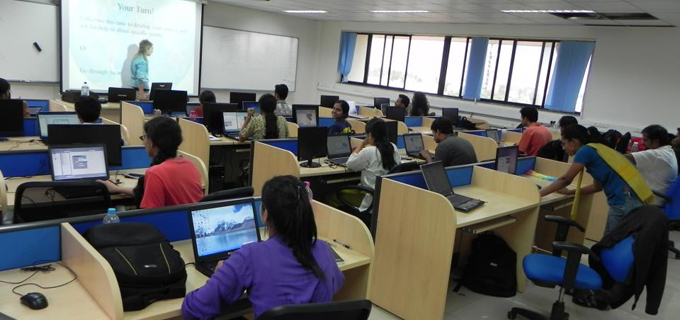Workshops

CES also conducts a number of workshops both at basic and advanced level that are aimed at providing important specialized skills to students. These tend to be intensive and run for a week or so. Some of the workshops may be open to non-CES students as well and many of these workshops are conducted by CES faculty at student conferences such as YETI and SCCS-Bangalore.
Title: SHORT-TERM WORKSHOP IN MOLECULAR PHYLOGENETICS
Instructor: Praveen Karanth
Duration: Five days
This rigorous, individualized, hands-on training course will provide participants an opportunity to learn the basic principles of molecular phylogenetics and its applications in biology. The course consists of theory and computer lab classes. Course topics include: Distance, Parsimony, Likelihood and Bayesian approaches to tree building, historical biogeography, phylogeography, character evolution, species tree estimation, molecular clock and dating nodes, molecular markers, hypotheses testing in phylogenetics framework. Hands-on training will be conducted in MEGA, PAUP, MrBayes, RAXml, BEAST, Mesquite, S-DIVA and LAGRANGE/BioGeoBEARS.
Remarks: Offered in CES every year in August.
Previously, we have had workshops on Inclusive Ecology, Statistics, Ecology through numbers, Phylogenetics, ArcGIS and Basics of Linux. Future workshops will be announced on the Events page. Below you will find brief descriptions of recent workshops conducted by CES faculty.
| Title | Inclusive Ecology |
| Instructor | Vishwesha Guttal and Kavita Isvaran |
| Duration | 3 hours |
| Description | The workshop will introduce participants to broad concepts and approaches in the fields of Ecology, Evolution, Behaviour, Conservation and Quantitative Thinking via workshops. We will also conduct workshops on building professional skills, careers in ecology, and life as a PhD. student. |
| Video links | Inclusive Ecology February 2023, Inclusive Ecology February 2021 |
| Remarks | Repeats every 2 years |
| Title | Ecology through numbers |
| Instructor | Vishwesha Guttal |
| Duration | 2 weeks |
| Description | The aim of this short workshop is to show that simple mathematical models of ecology are not all that mathematical, and they can be learnt by anyone with basic skills in arithmetic and algebra. So, no prerequisite, other than a keen interest in playing with numbers, and making biological sense of it, is needed. The workshop will involve doing some hands on numerical 'experiments'! So, please bring a scientific calculator that you are comfortable using, and a few blank papers. |
| Remarks | Also conducted by YETI, student ecology conference. |
| Title | R refresher workshop |
| Instructor | Kavita Isvaran |
| Duration | Roughly 1 week |
| Description | One part of the workshop would be aimed at students with data in hand and about to start data analysis with R, rather than considering using R in a year or two down the line. This workshop would be three sessions long (1) Briefly re introducing R, introducing how one brings in data, cleans up data, etc.(2) Exploring data both through descriptive statistics and through graphs.(3) Running linear models (regression, ANOVA, etc.) in R, looking at model diagnostics and interpreting model outputs (graphing coefficients,interpreting contrasts, etc.). The second part of the workshop would be an advanced workshop ongeneralized linear models and multivariable modelling, mainly aimed at students already comfortable with R and linear models. |
| Remarks | Typically offered every year within CES |
| Title | Introduction to Linux |
| Instructor | Vishwesha Guttal |
| Duration | 3 hours |
| Description | The aim of this "workshop" is to kick-start our new Lotka-Volterra Mathematical Ecology Laboratory and introduce people to linux platform on which these are based. It will focus on practical usage of Linux systems and how simple utilities like matlab, R, phylogenetic and GIS analysis can be performed on open source based operating systems. |
| Remarks |
